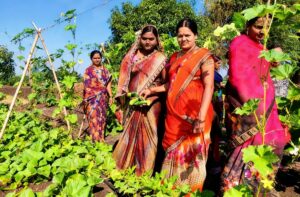We place major emphasis on fostering the expansion of a global family of research institutes and scientists dedicated to improving the productivity, profitability, stability, and sustainability of rice and rice farming systems. We rely on numerous pathways of collaboration – interactions with advanced research institutions all over the world; cooperation among scientists of many research disciplines and laboratories; our own global research services; the global research networks, and our agreements with national agriculture research system programs. In all these collaborations, research and training go hand in hand.
Her Excellency Corazon C. Aquino, President of the Republic of the Philippines, visited IRRI on 15 October 1986. During that visit, she delivered the 1986 World Food Day address, dedicated IRRI’s new Biotechnology and Seed Health Laboratory, and reviewed IRRI research programs.
 In her address, she spoke to some of the issues relating to agricultural research in general, to host country collaboration and cooperation, and to the challenges facing nations and the international agricultural research system. Some excerpts follow:
In her address, she spoke to some of the issues relating to agricultural research in general, to host country collaboration and cooperation, and to the challenges facing nations and the international agricultural research system. Some excerpts follow:
“Today, some 300 million tons of food grains are stored in the warehouses of both developed and developing countries. Most developing countries have been able to raise domestic food production above the levels of their population growth.
“How did this happen?
“Scientific research conducted by IRRI and other similar programs and research centers has been the principal catalyst of change…
“The green revolution in rice and other crops has brought his time. Time in which to get our global house in order to find the means and the political will to distribute the growing wealth of our world more equitably to those who still do not have the basic necessities of life, before their numbers outstrip the ability to feed them…
“I should like to thank the donors of IRRI for their support and concern for the welfare of our people, and the peoples of other developing countries of the world. I should also like to appeal for their continued and increased support. We are proud that the Philippines is the home of IRRI and grateful that the honor for its achievements has in some small measure reflected on ns who have hosted its efforts, even as we have enjoyed its benefits.”
We place major emphasis on fostering the expansion of a global family of research institutes and scientists dedicated to improving the productivity, profitability, stability, and sustainability of rice and rice farming systems. We rely on numerous pathways of collaboration – interactions with advanced research institutions all over the world; cooperation among scientists of many research disciplines and laboratories; our own global research services; the global research networks, and our agreements with national agriculture research system programs. In all these collaborations, research and training go hand in hand.
Nearly 5,000 rice scientists from 78 countries have been trained through IRRI so far. Many of those working for master’s and doctoral degrees have been trained jointly with the University of the Philippines at Los Baños, on whose campus IRRI is located. Countless other scientists have benefited from the growth that comes through professional collaboration.
Several countries that once had only a few personnel trained to undertake problem-solving rice research now have research institutions staffed and equipped at a professional level. Many IRRI alumni occupy responsible administrative positions in their national rice research institutes and research systems.
Progress in improving rice production and productivity in irrigated and favorable rainfed areas can be attributed, to a considerable extent, to these meaningful partnerships. We expect research on the less favorable rice environments of the world to be as productive. And we expect progress on both frontiers to accelerate because of the strength of our historical collaborations and the dynamism of our new collaborations.
Developments on many frontiers of science and technology are explosive. Biotechnology and genetic engineering, micro-electronics and computer sciences, satellite imagery and educational technology. As we look ahead, it is obvious that our patterns of collaboration and cooperation will continue to evolve as we exploit the emerging opportunities.
Already, the collaborations we have in highly technical and innovative research areas are stimulating all our research and training. The researcher interactions complement the resources and capabilities of the IRRI staff and the resources and capabilities of various national programs, particularly in the use of innovative research techniques.
Our collaborations with advanced research institutions involve numerous complex interactions. Some include the assignment of scientists to IRRI to conduct research of interest to IRRI and to the organizations seconding the scientists. In other partnerships, advanced scientific institutions apply sophisticated analytical techniques in their own laboratories to help resolve problems identified at IRRI. In 1986, we collaborated on more than 70 projects with advanced research centers in different parts of the world.







